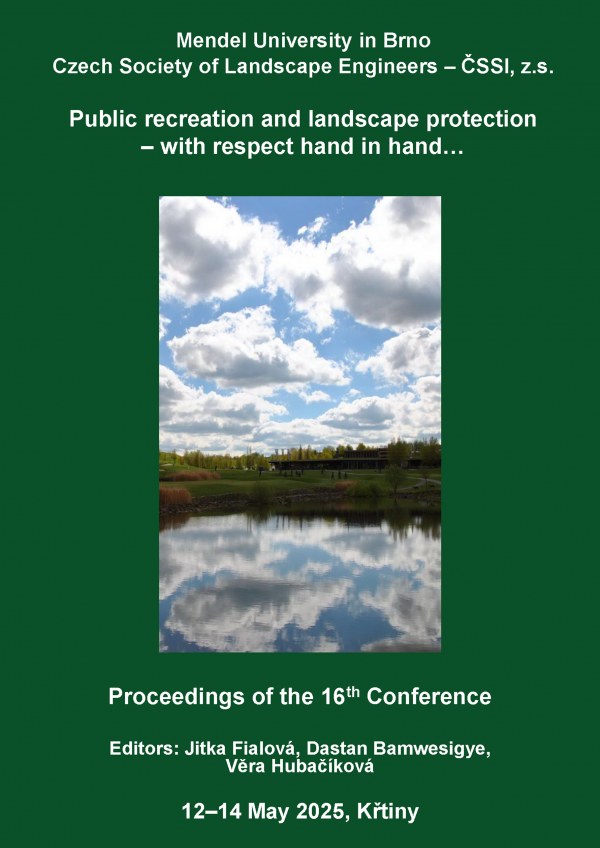
DOI: 10.11118/978-80-7701-025-2-0028
AI IN ENVIRONMENTAL EDUCATION: TOOLS, TRENDS, AND FUTURE DIRECTIONS
- Kristýna Balážová1, Štěpán Galle1, Anna Kandlová1, Tomáš Bendl1, 2
- 1 Department of Geography, Faculty of Science, Humanities and Education, Technical University of Liberec, Komenského 314/2, 460 01 Liberec V – Kristiánov, Czechia
- 2 Department of Social Geography and Regional Development, Faculty of Science, Charles University, Albertov 6, 128 00 Praha 2, Czechia
Artificial intelligence (AI) is rapidly advancing in education and has the potential to enhance various domains, including environmental education. Thus, the main purpose of this study is to identify AI tools that have the potential to support contemporary environmental education practices.
The research is methodologically conducted through a systematic review of academic contributions in scientific databases related to the application of AI in (environmental) education. The systematic review is structured in accordance with the PRISMA statement methodological framework.
The primary outcome is a classified overview of AI tools and a thematic synthesis of their applications across different educational levels within environmental education. Additionally, the findings contribute to the development of a currently underexplored theoretical framework for integrating AI into educational practice, laying the groundwork for future research and implementation of AI in environmental education.
Klíčová slova: artificial intelligence, systematic review, PRISMA statement. environmental education
stránky: 28-33, Publikováno: 2025, online: 2025
Reference
- Atkins, C., Girgente, G., Shirzaei, M. & Kim, J. (2024). Generative AI tools Can Cnhance Climate Literacy But Must be Checked for Biases and Inaccuracies. Communications Earth & Environment, 5, 226.
 Přejít k původnímu zdroji...
Přejít k původnímu zdroji... - Bahroun, Z., Anane, C., Ahmed, V. & Zacca, A. (2023). Transforming Education: A Comprehensive Review of Generative Artificial Intelligence in Educational Settings through Bibliometric and Content Analysis. Sustainability, 15, 12983.
 Přejít k původnímu zdroji...
Přejít k původnímu zdroji... - Baidoo-Anu, D. & Owusu Ansah, L. (2023). Education in the Era of Generative Artificial Intelligence (AI): Understanding the Potential Benefits of ChatGPT in Promoting Teaching and Learning. Journal of AI, 7(1), 52-62.
 Přejít k původnímu zdroji...
Přejít k původnímu zdroji... - Blandino, G., Montagna, F., Cantamessa, M., & Colombo, S. (2023). A comparative review on the role of stimuli in idea generation. Artificial Intelligence for Engineering Design, Analysis and Manufacturing, 37.
 Přejít k původnímu zdroji...
Přejít k původnímu zdroji... - Chang, C. H., Kidman, G. (2023). Mitigating Risks, Embracing Potential: A Framework for Integrating Generative Artificial Intelligence in Geographical and Environmental Education. International Research in Geographical and Environmental Education, online first.
- Cowls, J., Tsamados, A., Taddeo, M. & Floridi, L. (2023). The AI Gambit: Leveraging Artificial Intelligence to Combat Climate Change-Opportunities, Challenges, and Recommendations. AI & Society, 38, 283-307.
 Přejít k původnímu zdroji...
Přejít k původnímu zdroji... - Dede, C. Anderson, J. (2023). Educating in a World with Artificial Intelligence. Harvard Graduate School of Education. Dostupné z: https://www.gse.harvard.edu/ideas/edcast/23/02/educating-world-artificial-intelligence
- Griffiths, A. (2023). OK, Computer? Using Artificial Intelligence for Teaching and Learning About Climate Change. Teaching Geography, 48(2), 68-69.
- Hickman, J. & Ghosh, R. (2024). ChatGPT: Are Geography Teachers Redundant? Teaching Geography, 49(1), 18-19.
- Hsu, P. C. & Lin, H. (2023). Assessing ChatGPT for GIS education and Assignment creation. Journal of Geography in Higher Education, online first, 1-20.
- Lee, J., Yoon, S. & Kim, J. (2025). Leveraging retrieval-augmented generation (RAG) in geographic education: possibilities and challenges. Geography and Sustainability, online first, 1-15.
- Moher, D., Liberati, A., Tetzlaff, J., Altman, D. G., THE PRISMA GROUP (2009): Preferred Reporting Items for Systematic Reviews and Meta-Analyses: The PRISMA Statement. PLOS Medicine, 6, 7, 1-28.
 Přejít k původnímu zdroji...
Přejít k původnímu zdroji... - Naidoo, D. (2024). Designing Climate Change Curricula With Generative Artificial Intelligence: A South African perspective. Journal of Geography Education in Africa, online first, 1-13.
- Page, M. J., Mckenzie, J. E., Bossuyt, et al. (2021): The PRISMA 2020 Statement: An updated guideline for reporting systematic reviews. BMJ, 372, 71, 1-9.
 Přejít k původnímu zdroji...
Přejít k původnímu zdroji... - Rakuasa, H. (2023). Integration of Artificial Intelligence in Geography Learning: Challenges and Opportunities. Sinergi International Journal of Education, 1(2), 75-83.
 Přejít k původnímu zdroji...
Přejít k původnímu zdroji... - Rane, N. L., Choudhary, S. P. & Rane, J. (2024). Contribution of ChatGPT and Similar Generative Artificial Intelligence for Enhanced Climate Change Mitigation Strategies. Dostupné na SSRN: https://ssrn.com/abstract=4681720.
- Redican, K. & Davis, M. (2025). GeoAI and Remote Sensing for Urban Environmental Education: Trends, Challenges, and Future Directions. Environmental Education Research, online first, 1-18.
- Richards, D., Worden, D., Song, X. P. & Lavorel, S. (2024). Harnessing generative artificial intelligence to support nature-based solutions. People and Nature, 6, 882-893.
 Přejít k původnímu zdroji...
Přejít k původnímu zdroji... - Kamalov, F., Santandreu Calonge, D. & Gurrib, I. (2023). New Era of Artificial Intelligence in Education: Towards a Sustainable Multifaceted Revolution. Sustainability, 15(16), 12451.
 Přejít k původnímu zdroji...
Přejít k původnímu zdroji... - Scheider, S., Bartholomeus, H. & Verstegen, J. (2023). ChatGPT Is Not A Pocket Calculator-Problems of AI-chatbots for Teaching Geography. Available at SSRN: https://ssrn.com/abstract=2307.03196v1


